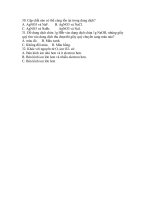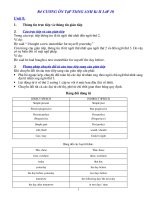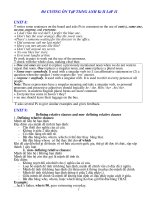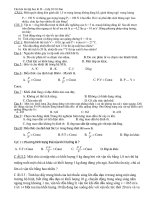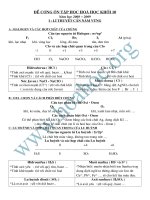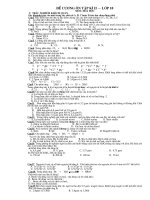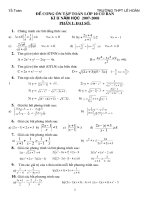De cuong on tap ki II Lop 10 CB
Bạn đang xem bản rút gọn của tài liệu. Xem và tải ngay bản đầy đủ của tài liệu tại đây (242.77 KB, 20 trang )
Đề CƯƠNG ÔN TậP TIếNG ANH Kì II LớP 10
Unit 8:
1. Thông tin trực tiếp và thông tin gián tiếp
a. Câu trực tiếp và câu gián tiếp
Trong câu trực tiếp thông tin đi từ ngời thứ nhất đến ngời thứ 2.
Ví dụ:
He said I bought a new motorbike for myself yesterday
Còn trong câu gián tiếp, thông tin đi từ ngời thứ nhất qua ngời thứ 2 và đến ngời thứ 3. Do vậy
có sự biến đổi về mặt ngữ pháp.
Ví dụ:
He said he had bought a new motorbike for myself the day before.
b. Ph ơng pháp chuyển đổi từ câu trực tiếp sang câu gián tiếp
Khi chuyển đổi từ câu trực tiếp sang câu gián tiếp cần phải:
Phá bỏ ngoặc kép, chuyển đổi toàn bộ các đại từ nhân xng theo ngôi chủ ngữ thứ nhất sang
đại từ nhân xng ngôi thứ 3.
Lùi động từ ở vế thứ 2 xuống 1 cấp so với ở mức ban đầu (lùi về thời).
Chuyển đổi tất cả các đại từ chỉ thị, phó từ chỉ thời gian theo bảng quy định.
Bảng đổi động từ
DIRECT SPEECH INDIRECT SPEECH
Simple present Simple past
Present progressive Past progressive
Present perfect
(Progressive)
Past perfect
(Progressive)
Simple past Past perfect
will /shall would / should
Can / may Could / might
Bảng đổi các loại từ khác.
This, these That, those
here, overhere there, overthere
today that day
1
yesterday the day before
the day before yesterday two days before
tomorrow the following day/ the next day
the day after tomorrow in two days time
next + thời gian (week, year ...) the following + thời gian (week, year...)
last + thời gian (week, year ...) the privious + thời gain (week, year...)
thời gian + ago thời gian + before/ the privious +thời gian
- Nếu là nói và thuật lại xảy ra trong cùng một ngày thì không cần phải đổi thời gian.
Ví dụ:
At breakfast this morning he said I will be very busy today
At breakfast this morning he said he would be very busy today.
- Việc điều chỉnh logic tất nhiên là cần thiết nếu lời nói đợc thuật lại sau đó 1 hoặc 2 ngày.
Ví dụ:
thứ 2 Jack nói với Tom:
Im leaving the day after tomorrow. (tức là thứ 4 Jack sẽ rời đi)
Nếu Tom thuật lại lời nói của Jack vào ngày hôm sau (tức là thứ 3) thì Tom sẽ nói:
Jack said he was leaving tomorrow.
Nếu Tom thuật lại lời nói của Jack vào ngày tiếp theo (ngày thứ 4) thì Tom sẽ nói:
Jack said he was leaving today.
2. Điều kiện có thể thực hiện đ ợc ở thời hiện tại.
Will/shall
If + Subject + simple present + subject + + [verb
in simple form]
can/ may
Ví dụ:
If I have the money, I will buy a new car.
If you try more, you will improve your English.
We will have plenty of time to finish the project before dinner if it is only ten oclock now.
2
If + subject + simple present tense + subject + ... + simple
present tense
Mẫu câu này còn đợc dùng để diễn tả một thói quen.
Ví dụ:
If the doctor has morning office hours, he visits his patients in the hospital in the afternoon
(không có động từ khuyết thiếu.)
John usually walks to school if he has enough time.
If + Subject + simple present tense ... + command
form* ...
* Nên nhớ rằng mệnh lệnh thức ở dạng đơn giản của động từ. ( simple form)
Mẫu câu trên có nghĩa là nhờ ai, ra lệnh cho ai làm gì.
Ví dụ:
If you go to the Post Office, please mail this letter for me.
Please call me if you hear from Jane.
UNIT 9:
1. Điều kiện không thể thực hiện đ ợc ở thời hiện tại.
Would/should
If + Subject + simple past + subject + +
verb in simple form
could/ might
Ví dụ:
If I had enough money now, I would buy this house
( but now I dont have enough money.)
If I had the time, I would go to the beach with you this weekend.
(but I dont have the time.) ( Im not going to the beach with you.)
He would tell you about it if he were here.
( he wont tell you about it.) ( He is not here).
If he didnt speak so quickly, you could understand him.
(He speaks very quickly.) (You cant understand him.)
L u ý:
Động từ to be sau if ở mẫu câu này phải chia làm were ở tất cả các ngôi.
3
I... they were.
Ví dụ:
If I were you, I wouldnt do such a thing.
(but Im not you.)
2. Should
Should + [Verb in simple form]
Nghĩa là :
- Nên ( diễn đạt một lời khuyên, đề nghị hoặc bắt buộc nhng không mạnh lắm)
- Có khi - dùng để diễn đạt mong muốn điều gì xảy ra.
Ví dụ:
It should rain tomorrow ( I expect it to rain tomorrow)
My check should arrive next week. ( I expect it to arrive next week).
Lu ý:
- Had better, ought to, be supposed to nói chung là đồng nghĩa với should với điều kiện là động
từ to be phải chia ở thời hiện tại.
- be supposed to ngoài nghĩa tơng đơng với should còn mang nghĩa quy định phải, bắt buộc
phải.
Ví dụ:
We are supposed to have a math test this afternoon, but it was postponed because the Professor
had to attend a science conference.
( Theo quy định là ....)
UNIT 10:
Câu bị động
Câu bị động đợc sử dụng nhằm để nhấn mạnh vào hành động của tân ngữ chứ không nhấn mạnh
vào hành động của chủ ngữ trong câu chủ động.
be + P
2
Ph ơng pháp chuyển đổi từ câu chủ động sang câu bị động.
- Đa tân ngữ của câu chủ động lên làm chủ ngữ. Trong trờng hợp nếu có 2 tân ngữ ( 1 trực tiếp,
1 gián tiếp), muốn nhấn mạnh vào tân ngữ nào thì ngời ta đa nó lên làm chủ ngữ ( nhng thòng là
tân ngữ gián tiếp làm chủ ngữ).
Ví dụ:
I gave him a book.
hay I gave a book to him.
4
Trong câu này book là tân ngữ trực tiếp, him là tân ngữ gián tiếp, ta đổi:
He was given a book by me.
- Thời của động từ ở câu bị động phải tuân theo thời của động từ ở câu chủ động.
- Đặt by + tân ngữ mới đằng sau tất cả các tân ngữ khác.
- to be made, to be made of đợc làm bằng - chỉ một vật đợc làm bằng 1 thứ nguyên vật liệu.
This table is made of wood.
- to be made from: đợc làm bằng - chỉ một vật đợc làm bằng 2 thứ nguyên vật liệu trở lên.
- to be made out of: đợc làm bằng ( dùng cho thực phẩm)
This cake is made out of flour, egg, butter and sugar.
- Mọi biến đổi về thời và thể đều nhằm vào động từ to be, còn phân từ 2 giữ nguyên (xem các
công thức dới đây.)
Simple present hay
simple past
am
is
are + [verb in past
participle]
was
were
Chủ động : Hurricanes destroy a great deal of property each year.
Subject present complement
Bị động : A great deal of property is destroyed by hurricanes each year.
singular subject be past participle
Chủ động : The tornado destroyed thirty houses.
Subject past complement
Bi động : Thirty houses were destroyed by the tornado.
plural subject be past participle
present progressive hay Past
progressive
am
is
are + being + [verb in past participle]
was
5
were
Chñ ®éng : The committee is considering several new proposals.
Subject present progressive complement
BÞ ®éng : Several new proposals are being considered by the committee.
plural subject auxiliary be past participle
Chñ ®éng : The committee was considering several new proposals.
Subject past progressive complement
BÞ ®éng : Several new proposals were being considered by the committee.
plural subject auxiliary be past participle
present perfect hay Past
perfect
has
have + been + [verb in past
participle]
had
Chñ ®éng: The company has ordered some new equipment.
subject present perfect complement
BÞ ®éng : Some new equipment has been ordered by the company.
Singular subject auxiliary be past participle
Chñ ®éng : The company had ordered some new equipment before the strike began.
subject past perfect complement
BÞ ®éng : Some new equipment had been ordered by the company before the strike began.
Singular subject auxiliary be past participle
§éng tõ khiÕm khuyÕt (modal)
modal + be + [ verb in past
participle]
Chñ ®éng : The manager should sign these contracts today.
Subject modal + verb complement
BÞ ®éng : These contracts should be signed by the manager today.
Subject modal be past participle
6
modal + perfect
modal + have + been + [ verb in past
participle]
Chủ động: Somebody should have called the president this morning.
Subject modal + perfect complement
Bị động : The president should have been called this morning.
Subject modal have be past participle
UNIT 11:
Điều kiện không thể thực hiện đ ợc ở thời quá khứ.
Would/should
If + Subject + past perfect + subject +
+ have + P
2
could / might
Ví dụ:
If we hadnt lost the way we could have been here in time.
(but in fact we lost the way, so we were late.)
If we had known that you were there, we would have written you a letter.
(We didnt know that you were there.) ( we didnt write you a letter.)
She would have sold the house if she had found the right buyer.
(She didnt sell the house.) (She didnt find the right buyer.)
If we hadnt lost the way, we would have arrived sooner.
(We lost our way.) (we didnt arrive early.)
Câu điều kiện không phải lúc nào cũng tuân theo đúng công thức trên, trong một số trờng
hợp 1 vế của câu điều kiện ở quá khứ còn một vế lại ở hiện tại do thời gian của từng mệnh đề
quy định.
Ví dụ:
If she had caught the flight she would be here by now.
L u ý:
Trong một số trờng hợp ở câu điều kiện không thể thực hiện đợc ở thời quá khứ, ngời ta
bỏ if đi và đảo had lên đầu câu nhng ý nghĩa vẫn giữ nguyên.
Had + subject + [verb in past participle ]...
Ví dụ:
Had we known you were there, we would have written you a letter.
7
Had she found the right buyer, she would have sold the house.
Hadn’t we lost the way, we would have arrived sooner.
UNIT 12:
1. Infinitive with to ( động từ nguyên mẩu có “to”)
To infinitive with to is used in these following situations:
1. The subject of a sentence:
Ex: to save money is necessary now.
2. The complement of a verb:
Ex: our duty is to study harder.
3. Object:
* To infinitive is used as object of these verbs:
“ agree, arrange, ask, attemp, begin, care, choose, decide, deserve, determine, edmand, desire,
expect, fail, forget, happen, hesitate, hope, intend, learn, manage, mean, neglect( bỏ mặc), offer,
plan, …
Ex: we hope to pass the next exam with high marks.
• To infinitive is used as object of these abjectives:
Able, afraid, amused, annoy, anxious, astonished, certain, delighted, eager, easy, glad, hard,
pleased, ready..
Ex: I’m very glad to see you again.
• To infinitive is used after “ for/ of”
Ex: I’ll wait for you to finish the tasks.
4. To infinitive is used after Noun or pronoun to replace for a clause.
Ex:English is an important language to master.
Ex: Have you got anyhting to read now?
5. To infinitive is used to express a purpose or result
Ex: We go to school to widen our knowledge.
Ex: He was born to succeed in many
2. C©u hái dµnh cho c¸c bæ ng÷ (when, where, why, how)
when
where
why
how
When did John move to Jacksonville?
Where does Mohamad live ?
Why did George leave so early?
How did Maria get to school today?
8
Auxiliary
+ be + subject + verb + (complement) + (modifier)
do, does, did

